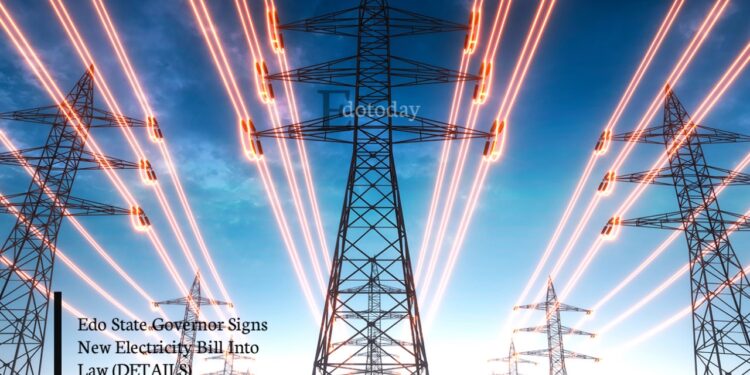Monday Okpebholo, the governor of Edo State, has signed the Edo State Electricity Law 2025, pledging the state’s increased electricity supply and energy independence.
The Edo State Electricity Law 2022 is repealed by the new law. It lays the groundwork for a more dependable and investor-friendly power industry in the state by establishing a structured framework for intrastate electricity generation, transmission, distribution, and regulation.
The Electricity Act 2023, which gives states the authority to control electricity inside their borders, is consistent with the legislation. With the law’s signature, Edo becomes the latest state to take control of its electrical infrastructure in order to promote commercial and industrial development.
The state’s competitive energy market is made possible by the recently passed Edo State Energy Law, which also creates chances for independent power producers and the private sector to participate.
According to Okpebholo, the law establishes a regulated market that permits both public and private organizations to produce, distribute, and exchange electricity inside the state.
A number of important organizations are also established under the law, such as the Edo State Electricity Regulatory Commission, which is in charge of licensing, rates, compliance, and consumer protection. The Edo State Electricity Transmission Company, Edo State Electrification Agency, and Edo State Electricity Advisory Council are further entities.
Mr. Odion Omonfoman, the Group Managing Director of New Hampshire Capital and Lead Consultant on Power to the Nigeria Governors Forum, commented on the news, calling the new law a “game-changer” for the energy industry in Edo State.
According to Omonfoman, the law provides a stable and transparent regulatory framework that will attract investment, improve electricity access, and support industrialisation.
“The Edo State Electricity Law 2025 is a landmark legislation that positions Edo State as a leader in sub-national electricity reform. It creates a structured and competitive market, which is critical for attracting private sector investments in power generation and distribution.”
“By establishing the ESERC as an independent regulator, the law ensures transparency, regulatory certainty, and consumer protection—all of which are essential for a thriving electricity sector,” he said.
Speaking on investment prospects, Omonfoman emphasised that the law will unlock new opportunities for both local and international investors in power generation, mini-grid solutions, and renewable energy development.
“This law sets the foundation for decentralised power generation and distribution, which is crucial for meeting the electricity demand of Edo State’s industries, businesses, and households. As an investor in the power sector, I see enormous potential in leveraging this framework to develop embedded generation projects, renewable energy initiatives, and rural electrification schemes,” he added.












